
Virtual Phone System for Small Business: A Complete Guide
 Updated on
Updated on
 By Katie Bowman
By Katie Bowman
Katie Bowman
Katie has extensive experience in customer service and enjoys the opportunity to help others. She is committed to providing high-quality service and d...
learn more
Katie Bowman
Katie has extensive experience in customer service and enjoys the opportunity to help others. She is committed to providing high-quality service and d...
Table of Contents
Table of Contents
Are you tired of juggling multiple phone lines, missing important calls, or struggling to maintain a professional image for your small business? Say goodbye to outdated phone systems and embrace the future of communication with a virtual phone system for small businesses.
This game-changing technology has the potential to revolutionize the way you communicate, streamline operations, and take your small company to new heights of success.
Imagine having a virtual receptionist at your fingertips, available to handle calls efficiently and professionally from anywhere. With advanced features like call routing, automated greetings, voicemail transcription, and call forward, you can provide a seamless customer experience and make lasting impressions.
But what sets the best small business virtual phone system apart from the rest? It's all about affordability, customization, and scalability. With a virtual phone system for small businesses, you can tailor phone setups to meet your company's unique requirements. Add and remove extensions as the team grows and only pay for the utilized features.
Here's what we'll cover in this article:
- What is a virtual phone system for a small business?
- How does a virtual phone system work?
- Landline vs. virtual phone service: Understanding the difference
- The incredible benefits of SMB virtual phone systems
- Must have features of a virtual phone system for small business
- Key factors to consider when choosing a virtual phone system
- Unveiling the best virtual phone systems for small business
- Why Ringy is the ultimate choice for small business virtual phone services
Get ready to transform small business communication and discover the true potential of a virtual phone system.
Let's dive in!
What Is a Small Business Virtual Phone System?

Are you exhausted from your phone system, leaving you in a tangled mess of wires? Say "Adios Amigos" to those chaotic landlines of the past and say "Bonjour" to the future of communication with a small business virtual phone system.
It's a robust tool that helps your organization sing like a well-rehearsed cappella group.
So what exactly is this marvel of technology?
A small business virtual phone system is like having a superhero sidekick dedicated solely to handling your calls. It's an online cloud-based phone service allowing business call management, no matter where employees are. Consider it a trusty sidekick, ensuring that no calls are missed while impressing customers with lightning-fast responses.
Let's look at the intricacies of a small business virtual phone system with a table of nuances.
|
Nuance |
Explanation |
|
Virtual Receptionist |
Welcome callers with professional greetings and customizable menus. |
|
Call Routing |
Direct calls to the right department or team members, ensuring efficient communications and increased productivity. |
|
Mobile Capabilities |
Most software has mobile apps that allow agents to take calls on the go. |
|
CRM integration |
You can sync a virtual phone system with your customer relationship management software (note—Ringy has CRM software built in.) |
|
Analytics and reporting |
Gain insights and build reports about call volume, duration, and customer interactions for informed decision-making. |
|
Flexibility and scalability |
Easily add or remove features, integrations, and extensions as your company dilates or contracts. |
|
Cost Savings |
Avoid the high setup and maintenance costs of traditional phone systems. |
|
Voicemail Transpirations |
Automatically transcribe voicemails into text, allowing quick and easy message retrieval. |
|
Conference calling |
Conduct virtual meetings with clients or team members, fostering collaboration. |
These nuances paint a vibrant picture of the capabilities of a virtual phone system for small businesses. It's dynamic and features rich solutions that empower your company to communicate efficiently, impress clients, and adapt to changing requirements.
Get ready to ditch the tangled wires, embrace the cloud, and take your organization's communication to the next level with small business virtual phone systems.
Your customers will thank you, and you'll wonder how you ever managed without it!
How Does a Virtual Phone System for Small Businesses Work?
A virtual phone system for small business removes the cable mess and transports your calling activities to the cloud, eliminating the need for bulky equipment or physical phone lines.
Calls are routed over VoIP, providing accessibility and flexibility from any location with an internet connection.
The best virtual phone systems have intuitive user interfaces and setup procedures that even the biggest technophobe will understand. You can also use a local or toll-free number once transferring your current company digits to a virtual phone system provider.
A virtual phone system for small business also allows you to:
- Add team members
- Setup call menu options
- Assign extensions
- Create greetings
- Add devices that will ring when a customer dials your business number
Another excellent addition to the virtual phone system for small business experience is a VoIP desk or softphone. These devices retail for around $100, and login credentials for that phone are obtained from your virtual phone system provider.
In essence, a virtual phone system for small business leverages the power of cloud technology to provide a flexible, feature-rich, scalable communication solution that simplifies and enhances business communication processes.
Steps for Setting Up a Virtual Phone System for Small Businesses
Setting up a virtual phone system for your small business can greatly enhance communication and professionalism. Here are the essential steps to get you started:
Ensure You Have a Strong Internet Connection
Before diving into the setup process, it's crucial to ensure that your small business has a reliable and robust internet connection. A virtual phone system relies on the internet to transmit calls and data. A stable and high-speed internet connection will ensure clear voice quality and uninterrupted service.
Softphones vs. Hardware
Next, you'll need to decide whether to use softphones or hardware for your virtual phone system. Softphones are software-based phone applications that can be installed on computers, smartphones, or tablets. They are cost-effective and provide flexibility as they can be used on various devices.
On the other hand, hardware solutions involve physical desk phones that offer a traditional look and feel. The choice depends on your business's specific needs and preferences.
Find a Provider
Choosing the right virtual phone system provider is a critical decision. Look for a provider that offers the features and pricing that align with your small business requirements. Key factors to consider include call management features, scalability, customer support, and integration options. Popular virtual phone system providers include RingCentral, Grasshopper, and 8x8.
Set Up a Business Phone Number
Once you've selected a provider, it's time to set up your business phone number. You can choose to get a new, dedicated business number or port an existing one. Having a professional and unique business number enhances your brand identity and separates personal and business calls.
Register for A2P DLC
A2P (Application-to-Person) DLC (Distributed Ledger Certification) is a legislation designed to regulate the use of phone numbers for communication purposes, particularly SMS and voice calls. To ensure compliance with A2P DLC, it's essential to register your business phone number appropriately.
With our CRM, you can easily register for A2P DLC by following these steps:
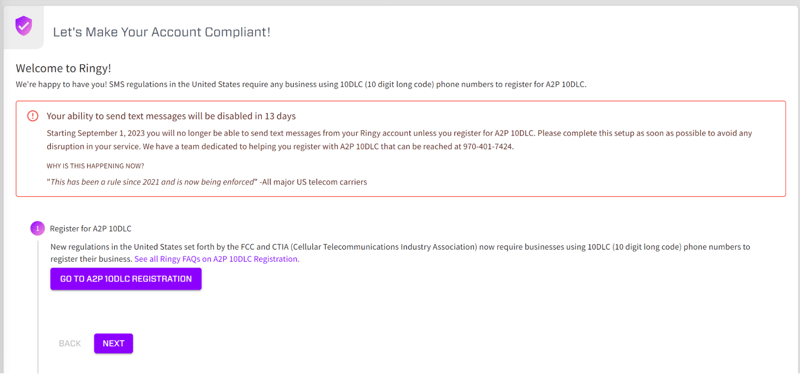
Compliance with A2P DLC is essential to avoid potential penalties and ensure that your business communication remains uninterrupted.
Test Call Quality and Calling Features
Before fully implementing your virtual phone system, conduct thorough testing. Make test calls to ensure call quality is satisfactory. Additionally, explore and familiarize yourself with the calling features provided by your chosen virtual phone system, such as call forwarding, voicemail setup, and call routing.
This step ensures that your small business is ready to provide excellent customer service and efficiently manage incoming and outgoing calls.
Onboard and Train Staff
Efficiently onboarding and training your staff is a crucial step in implementing a virtual phone system for your small business. To ensure a smooth transition and optimal use of the system, follow these concise guidelines:
- Orientation: Start by introducing your staff to the new virtual phone system.
- Hands-on Training: Provide hands-on training sessions where employees can practice making and receiving calls, accessing voicemail, and using call management features.
- Documentation: Create easy-to-follow guides or manuals that employees can refer to when they have questions or need assistance.
- Support Channels: Establish clear channels for support and assistance.
- Feedback Loop: Encourage staff to provide feedback on their experience with the virtual phone system.
- Regular Updates: Stay proactive by keeping your team informed about any system updates or new features.
Landline vs Virtual Phone Systems for Small Businesses

When selecting a communication solution for your small company, understanding the difference between virtual phone systems and traditional landlines is essential.
Let's compare these two to see why a virtual phone system is ideal for small businesses.
|
Feature |
Landline |
Small Business Virtual Phone System |
|
Portability |
Anchored to one location |
Take it with you wherever you go |
|
Features |
Basic and outdated |
Advanced call management and routing |
|
Cost |
Sky-high |
Budget-friendly and scalable |
|
Setup |
Complicated and messy |
Quick and hassle-free |
A landline relies on traditional copper wiring, confining communication to a fixed location. In contrast, a virtual phone system operates on cloud-based technology, allowing you to connect and communicate anywhere.
When evaluating the advantages and disadvantages of a virtual phone system for small businesses, it becomes evident that it outperforms a landline regarding features, setup, cost-effectiveness, scalability, and mobility.
Equip your small company with the tools to thrive and stay connected in today's dynamic business landscape.
3 Benefits of Small Business Virtual Phone Systems
In a world of critical communication, small businesses need a virtual phone system to unleash their true potential. These monoliths of modern technology offer a treasure trove of advances that will make your organization stand out like a peacock in a flock of pigeons.
Let's explore the top three reasons why a virtual phone system is perfect for small businesses.
Improved Responsiveness
Being responsive is essential for developing top-notch customer service, but it's only sometimes practical. A virtual phone system for small businesses lets agents respond to more calls and keep customers satisfied.
You can impress clients and partners with a virtual phone system for small businesses that exude professionalism, like a tuxedo-clad penguin. With its features like automated text response and virtual receptionist, your company will sound as polished as a British butler offering afternoon tea.
And here's a secret: Ringy, our CRM and virtual phone system for small business, take professionalism to the next era with its sleek, customizable greetings and innovative user interface that can make even James Bond envious.
Reduced Amount of Tedious Work
Customer calls can sometimes feel like a never-ending loop of deja vu, sucking away your precious time and derailing productivity faster than a runaway train. It's like a relentless game of phone tag, and you're the unwilling participant.
But fear not, for the virtual phone system for small businesses is here to save the day.
Imagine the bliss of confidently missing specific phone calls, knowing they will be seamlessly directed to the exact person or place that can offer customer support and assistance. It's like having a team of super-powered call-routing ninjas working tirelessly in the background, ensuring no call goes misplaced or unanswered.
With the ingenious virtual phone system for small businesses by your side, it's time to reclaim focus and tackle activities that truly matter in your organization.
No more wasted minutes playing a never-ending game of "Who can I transfer you to?" or feeling trapped in a never-ending episode of "Phone Call Groundhog Day."
Ability to Focus on Growing Your Company
Cloud-based phone systems are like having a magical clone of yourself without all the sci-fi complications. It's like being an actual CEO, able to step back and let the virtual phone system handle your customers' needs while you bask in the glory of knowing they're in good hands.
Picture this: you're sipping a fancy umbrella drink on a beach, lounging in your CEO-worthy attire (think Hawaiian shirt and flip-flops), while your virtual phone system diligently takes care of customers. It's like having a personal assistant who never takes vacations, complains about Mondays, or raids the office snack stash.
With a virtual phone system for small businesses as your trusty sidekick, you can finally bid farewell to endless hours of mind-numbing admin work—no more drowning in a sea of spreadsheets or battling a never-ending army of sticky notes.
Instead, you can channel your time and energy into activities that propel your business forward, like plotting world domination or coming up with the next viral cat video sensation.
Features of Virtual Phone Systems for Small Business

When effectively organizing content or managing company communications, a virtual phone system for small businesses is a must-have tool. Packed with a wide range of features developed to streamline communication processes, enhance customer experiences, and boost productivity, a virtual phone system is a secret ingredient that can take your organization to the moon.
Let's explore the key features that make a virtual phone system a game-changer for small companies.
Automated Attendant
Say goodbye to the days of manual call routing and hello to the automated attendant feature.
Acting as your virtual receptionist, this feature greets callers with a professional voice prompt and offers menu options to direct them to the appropriate department or extension. It's like having a round-the-clock receptionist without the expense or need for extra office space.
Call Forwarding and Routing
Whether working remotely or on the go, routing and call forwarding ensures agents never miss an important call; with these features, incoming calls can be seamlessly forwarded to a mobile device or any other designated phone number, ensuring customers are always assisted no matter where they are.
Here are two other call-forwarding and routing features:
- Time-based routing: Set up rules to route calls based on the time of day or specific schedules, ensuring calls are directed to the correct place at the right time.
- Multi-location routing: If your organization has multiple locations, geo-routing can intelligently divert calls to the nearest office or specific employees and teams.
Think of a virtual phone system for small businesses as your virtual concierge that keeps you in the loop when you're sipping that pina colada on a tropical beach.
Voicemail to Email
If you're drained from sifting through a mountain of voicemails, don't worry. You're not alone. Imagine converting voicemails into convenient email messages, allowing you to access and organize contacts directly from your inbox or sales dashboard.
You'll be able to prioritize voicemails of leads and deals, ensuring efficient responses and follow-up times.
If the virtual phone system for a small business provider offers a mobile app, this information can also be accessed from a smartphone, tablet, computer, or any other compatible device.
Call Recording
Recording and reviewing customer calls ensure high-quality client services and improved retention rates.
Monitoring interaction data can also help you:
- Identify training opportunities
- Maintain compliance
- Determine customer needs, preferences, and pain points
Call recording serves as evidence in case of disputes or misunderstandings, facilitating accurate resolutions. Analyzing call recordings helps evaluate client interactions, identify improvement areas, and provide targeted coaching.
Reporting and Analytics
A virtual phone system for small businesses gives you insights into call metrics that can be utilized to improve campaigns and other marketing objectives. Call data you may receive include but is not limited to:
- Peak times
- Volume
- Call Duration
A pro tip would be to monitor the performance of individuals or departments to recognize top performers or identify trends. This data-driven approach helps improve the customer journey while adjusting strategies accordingly.
Considerations When Choosing a Small Business Virtual Phone Service

Choosing an exemplary virtual phone service for small businesses is a critical decision. It can significantly impact communication efficiency, customer satisfaction, and company success.
Here are some key considerations to keep in mind when selecting a virtual phone system for small business.
- Compatibility and Integration: Assess integration capabilities with existing business tools, including email platforms, calendars, and CRM systems. Seek providers that offer seamless integration to enhance workflow efficiency and centralize customer data.
- Service Level Agreements and Customer Support: Evaluate customer support quality and availability offered by virtual phone service providers. Review SLAs to understand support availability, resolution times, and guaranteed uptime. Consider providers with 24/7 support and a strong reputation for customer service.
- Call Quality and Reliability: Prioritize call quality and reliability as crucial factors for a virtual phone system. Choose providers with robust network infrastructure and a history of uptime. Check for failover and redundancy systems to ensure uninterrupted service during outages. Opt for high-definition voice quality to convey professionalism and precise communication to clients.
- Ease of use: Look for a virtual phone system that offers an intuitive and user-friendly interface. Also, choose a service that allows for a hassle-free and rapid setup process. Minimal downtime ensures that your business can seamlessly transition to the new phone system.
- Device compatibility: Ensure that the virtual phone system is compatible with various devices, including smartphones, desktop computers, and desk phones. This flexibility allows your team to stay connected regardless of their preferred devices.
- Calling and Dialing Features: Evaluate the system's call management capabilities, including call forwarding, call routing, and call recording. Assess the system's conference calling capabilities, especially if your business frequently conducts remote meetings.
- Balance of Price: Consider your budget and choose a virtual phone service that offers pricing plans that align with your financial constraints. Be aware of any hidden fees or extra charges.
- Feature Set: Determine the features that matter most to your business, such as auto-attendants, virtual receptionists, call analytics, or integration with other business tools. Opt for a service that provides the features essential for your specific needs.
Best Small Business Virtual Phone Systems
When finding the best virtual phone system for your small business, you must explore options and choose a provider that meets your specific needs.
Here are three top contenders in the market.
Ringy
Our platform is not just an average virtual phone system for small businesses: it's the superhero of communications solutions you need!
With its incredible features and user-friendly interface, Ringy swoops in to save the day and streamlines your business communication like never before.
Let's take a closer look at why Ringy stands out from the crowd:
|
Feature |
Description |
|
Local ID |
Utilize local ID to connect more calls and start meaningful conversations. |
|
Calling |
Call, schedule, track, and report directly from Ringy's sales dashboard with KPIs. |
|
Integrations |
Ringy effortlessly integrates with all your native business tools. |
|
DRIP SMS and email campaigns |
Nurture client relationships and build meaningful connections that convert. |
|
Track communications |
Import leads or add new ones as you interact with them. Get to know where each one is in the sales pipeline and what needs to happen next for them to take action. |
With Ringy by your side, expect to receive unmatched reliability, excellent call quality, and a support team with quicker responses than a superhero hotline. Plus, with its scalability and affordable pricing, Ringy adapts to your growing organization's needs without breaking the bank.
Nextiva
Nextiva is like the rockstar of unified communication platforms, ready to rock your company's messaging, video conference, and phone calls like a wild guitar solo. Unlike other providers who stick to rigid plans, Nextiva lets you unleash your creativity and mix and match to create a custom phone system as unique as your favorite playlist.
Check out these HIPAA-compliant features that make your business shout "Encore!"
- Virtual faxing: Leave those old fax machines in the past and embrace the digital revolution.
- Software integrations: Sync up Nextiva with your favorite business tools for a seamless workflow.
- Advanced interactive voice response: Impress callers with a customized interactive experience.
From SSAE 16-certified data centers to a robust, redundant call path network and multiple points of presence across the U.S., Nextivas got your back. And don't forget to sign that comprehensive business associate agreement to ensure you're in tune with all the HIPAA regulations.
Ooma
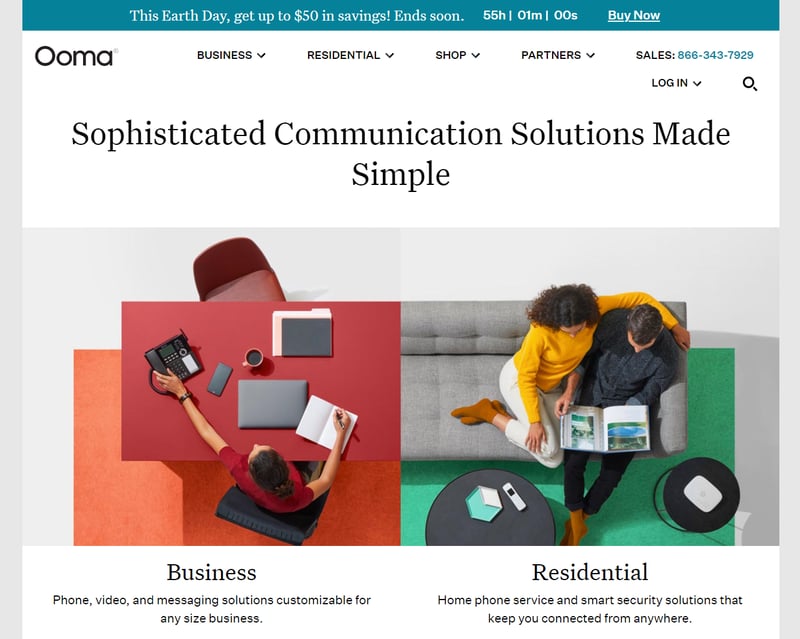
Ah, Ooma, the triple threat of virtual phone systems for small businesses. The company has three offerings: Essentials, Pro, and Pro Plus.
Ooma defies the norm by offering month-to-month pricing that won't make you break into a sweat, no matter how many users accounts you have. They say, "Hey, small businesses, we've got your back, and we won't charge you extra for having more friends at the party!"
The platform has a user-friendly interface with a lightning-fast implementation that'll make you wonder if they hired a team of magical unicorns to make it all happen as fast as possible.
For most small businesses, Ooma's Essentials plan is a true gem. It's a no-frills, straightforward virtual phone system for small businesses that transform you into a professional calling ninja. Your callers will be impressed, and you'll feel like a proper business pro, all without the hassle and headaches.
8x8
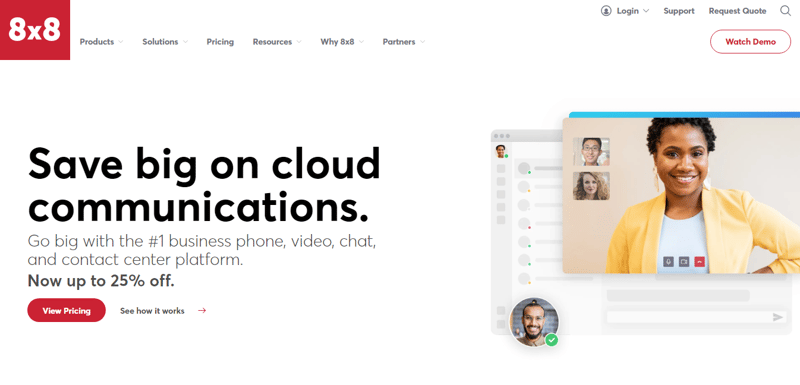
8x8 is a comprehensive virtual phone system designed to cater to the communication needs of small businesses. It offers a wide range of features to enhance voice communication and collaboration.
Key Features:
- VoIP Calling: 8x8 provides high-quality Voice over Internet Protocol (VoIP) calling, ensuring crystal-clear voice quality.
- Video Conferencing: It includes video conferencing capabilities, making remote meetings and collaboration seamless.
- Team Messaging: Users can send instant messages and collaborate in real-time through the integrated team messaging platform.
- Auto Attendant: Create custom auto-attendant menus to route calls efficiently and provide professional greetings.
- Integration: Integrates with various business applications like G Suite, Microsoft 365, and CRM systems for streamlined operations.
- Analytics: Analyze call data, performance metrics, and user insights to make data-driven decisions.
- Call Recording: Record calls for training, compliance, or quality assurance purposes.
RingCentral
RingCentral is a renowned virtual phone system trusted by businesses of all sizes. It offers a feature-rich communication platform to enhance productivity and customer engagement.
Key Features:
- Unified Communications: RingCentral provides a unified platform for voice, video, team messaging, and collaboration.
- HD Video Meetings: Conduct high-definition video conferences with screen sharing, file sharing, and annotation features.
- Voicemail to Text: Automatically transcribe voicemails to text for quick message retrieval.
- Intelligent Call Routing: Route calls based on rules, time of day, or geographic location to ensure callers reach the right person or department.
- Internet Fax: Send and receive faxes online without the need for physical fax machines.
- Call Analytics: Gain insights into call data, call quality, and user performance through detailed analytics.
- Integration: Seamlessly integrate with business apps like Salesforce, Microsoft Teams, and Slack.
- Team Collaboration: Facilitate teamwork with file sharing, task management, and real-time messaging.
Virtual Phone System for Small Business - Final Thoughts
The world of virtual phone systems for small businesses is like a magical realm where communication becomes a breeze, customer satisfaction skyrockets, and success is just a phone call away.
By embracing the power of virtual phone systems, small businesses can level up their professionalism, streamline operations, and leave lasting impressions on clients.
If you are searching for the creme de la creme of virtual phone systems, look no further than Ringy. The software's unbeatable features, top-notch customer support, and seamless integrations make Ringy the knight in shining armor that releases small companies from the clutches of mediocre and traditional phone systems.
Request a demo to discover how Ringy can take your agency to new heights!

Skyrocket your sales with the CRM that does it all.
Calling? Check. SMS? Check. Automation and AI? Check. Effortlessly keep in touch with your customers and boost your revenue without limits.

Take your sales to new heights with Ringy.
Sales in a slump? Ringy gives you the tools and flexibility you need to capture leads, engage with them, and turn them into customers.
Subscribe to Our Blog
Enter your email to get the latest updates sent straight to your inbox!
Categories
Related Articles


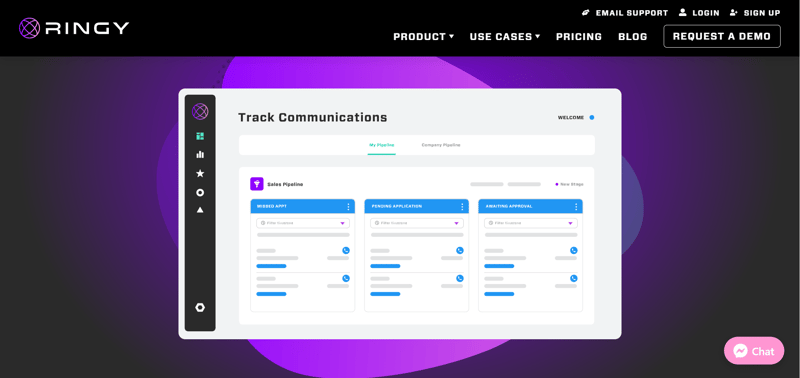
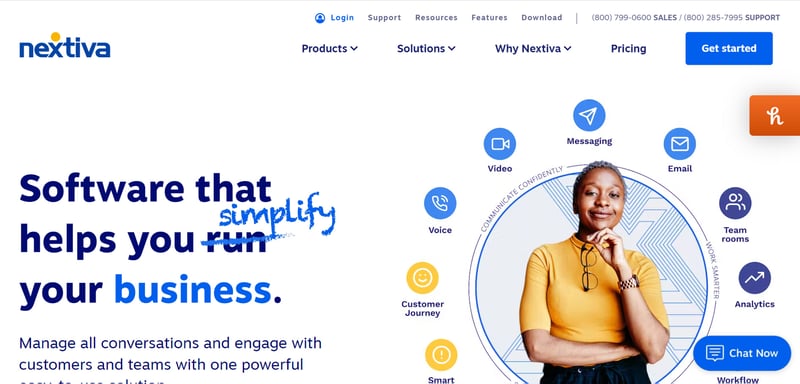












.jpg)




.jpg)

.jpg)



















































